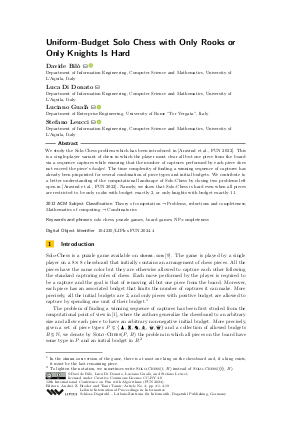Uniform-Budget Solo Chess with Only Rooks or Only Knights Is Hard
Authors
Davide Bilò  ,
Luca Di Donato,
Luciano Gualà
,
Luca Di Donato,
Luciano Gualà  ,
Stefano Leucci
,
Stefano Leucci 
-
Part of:
Volume:
12th International Conference on Fun with Algorithms (FUN 2024)
Part of: Series: Leibniz International Proceedings in Informatics (LIPIcs)
Part of: Conference: International Conference on Fun with Algorithms (FUN) - License:
 Creative Commons Attribution 4.0 International license
Creative Commons Attribution 4.0 International license
- Publication Date: 2024-05-29
File

PDF
LIPIcs.FUN.2024.4.pdf
- Filesize: 1.06 MB
- 19 pages
Document Identifiers
Subject Classification
ACM Subject Classification
- Theory of computation → Problems, reductions and completeness
- Mathematics of computing → Combinatorics
Keywords
- solo chess
- puzzle games
- board games
- NP-completeness
Metrics
- Access Statistics
-
Total Accesses (updated on a weekly basis)
0PDF Downloads0Metadata Views
Abstract
We study the Solo-Chess problem which has been introduced in [Aravind et al., FUN 2022]. This is a single-player variant of chess in which the player must clear all but one piece from the board via a sequence captures while ensuring that the number of captures performed by each piece does not exceed the piece’s budget. The time complexity of finding a winning sequence of captures has already been pinpointed for several combination of piece types and initial budgets. We contribute to a better understanding of the computational landscape of Solo-Chess by closing two problems left open in [Aravind et al., FUN 2022]. Namely, we show that Solo-Chess is hard even when all pieces are restricted to be only rooks with budget exactly 2, or only knights with budget exactly 11.
Cite As Get BibTex
Davide Bilò, Luca Di Donato, Luciano Gualà, and Stefano Leucci. Uniform-Budget Solo Chess with Only Rooks or Only Knights Is Hard. In 12th International Conference on Fun with Algorithms (FUN 2024). Leibniz International Proceedings in Informatics (LIPIcs), Volume 291, pp. 4:1-4:19, Schloss Dagstuhl – Leibniz-Zentrum für Informatik (2024)
https://doi.org/10.4230/LIPIcs.FUN.2024.4
BibTex
@InProceedings{bilo_et_al:LIPIcs.FUN.2024.4,
author = {Bil\`{o}, Davide and Di Donato, Luca and Gual\`{a}, Luciano and Leucci, Stefano},
title = {{Uniform-Budget Solo Chess with Only Rooks or Only Knights Is Hard}},
booktitle = {12th International Conference on Fun with Algorithms (FUN 2024)},
pages = {4:1--4:19},
series = {Leibniz International Proceedings in Informatics (LIPIcs)},
ISBN = {978-3-95977-314-0},
ISSN = {1868-8969},
year = {2024},
volume = {291},
editor = {Broder, Andrei Z. and Tamir, Tami},
publisher = {Schloss Dagstuhl -- Leibniz-Zentrum f{\"u}r Informatik},
address = {Dagstuhl, Germany},
URL = {https://drops.dagstuhl.de/entities/document/10.4230/LIPIcs.FUN.2024.4},
URN = {urn:nbn:de:0030-drops-199121},
doi = {10.4230/LIPIcs.FUN.2024.4},
annote = {Keywords: solo chess, puzzle games, board games, NP-completeness}
}
Author Details
- Department of Information Engineering, Computer Science and Mathematics, University of L'Aquila, Italy
- Department of Information Engineering, Computer Science and Mathematics, University of L'Aquila, Italy
References
- N. R. Aravind, Neeldhara Misra, and Harshil Mittal. Chess is hard even for a single player. In Pierre Fraigniaud and Yushi Uno, editors, 11th International Conference on Fun with Algorithms, FUN 2022, May 30 to June 3, 2022, Island of Favignana, Sicily, Italy, volume 226 of LIPIcs, pages 5:1-5:20. Schloss Dagstuhl - Leibniz-Zentrum für Informatik, 2022. URL: https://doi.org/10.4230/LIPICS.FUN.2022.5.
- Giuseppe Di Battista, Peter Eades, Roberto Tamassia, and Ioannis G. Tollis. Algorithms for drawing graphs: an annotated bibliography. Comput. Geom., 4:235-282, 1994. URL: https://doi.org/10.1016/0925-7721(94)00014-X.
- Davide Bilò, Luciano Gualà, Stefano Leucci, Guido Proietti, and Mirko Rossi. On the pspace-completeness of peg duotaire and other peg-jumping games. In Hiro Ito, Stefano Leonardi, Linda Pagli, and Giuseppe Prencipe, editors, 9th International Conference on Fun with Algorithms, FUN 2018, June 13-15, 2018, La Maddalena, Italy, volume 100 of LIPIcs, pages 8:1-8:15. Schloss Dagstuhl - Leibniz-Zentrum für Informatik, 2018. URL: https://doi.org/10.4230/LIPICS.FUN.2018.8.
- Josh Brunner, Lily Chung, Michael J. Coulombe, Erik D. Demaine, Timothy Gomez, and Jayson Lynch. Complexity of solo chess with unlimited moves. CoRR, abs/2302.01405, 2023. URL: https://doi.org/10.48550/ARXIV.2302.01405.
- Aviezri S. Fraenkel and David Lichtenstein. Computing a perfect strategy for n x n chess requires time exponential in n. J. Comb. Theory, Ser. A, 31(2):199-214, 1981. URL: https://doi.org/10.1016/0097-3165(81)90016-9.
-
M. R. Garey and David S. Johnson. Computers and Intractability: A Guide to the Theory of NP-Completeness. W. H. Freeman, 1979.

- M. R. Garey, David S. Johnson, and Robert Endre Tarjan. The planar hamiltonian circuit problem is np-complete. SIAM J. Comput., 5(4):704-714, 1976. URL: https://doi.org/10.1137/0205049.
- Luciano Gualà, Stefano Leucci, Emanuele Natale, and Roberto Tauraso. Large peg-army maneuvers. In Erik D. Demaine and Fabrizio Grandoni, editors, 8th International Conference on Fun with Algorithms, FUN 2016, June 8-10, 2016, La Maddalena, Italy, volume 49 of LIPIcs, pages 18:1-18:15. Schloss Dagstuhl - Leibniz-Zentrum für Informatik, 2016. URL: https://doi.org/10.4230/LIPICS.FUN.2016.18.
- Chess.com LLC. Solo Chess - Capture All the Pieces on the Board. https://www.chess.com/solo-chess. Accessed: 2024-02-25.
- James A. Storer. On the complexity of chess. J. Comput. Syst. Sci., 27(1):77-100, 1983. URL: https://doi.org/10.1016/0022-0000(83)90030-2.
-
Ryuhei Uehara and Shigeki Iwata. Generalized hi-q is np-complete. IEICE TRANSACTIONS (1976-1990), 73(2):270-273, 1990.

- Leslie G. Valiant. Universality considerations in VLSI circuits. IEEE Trans. Computers, 30(2):135-140, 1981. URL: https://doi.org/10.1109/TC.1981.6312176.
